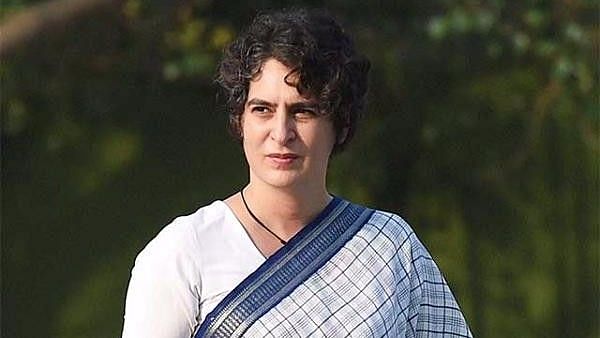The rent assigned for the bungalow is said to be Rs 37,000 per month, a rent at which apartments are available in far-flung areas of Delhi like Dwarka, Patparganj, etc.
The eviction notice served on Priyanka Gandhi Vadra has brought to relief a trait of India’s democracy which has no known parallels in other major democracies in the world: provision of niche government accommodation in downtown area of the national capital to people not occupying any elected or otherwise designated public office. The rent assigned for the bungalow occupied by Ms Vadra is said to be Rs 37,000 per month—a rent at which normally apartments are available in far-flung areas of Delhi like Dwarka, Patparganj, Rohini, etc. Rental of a decent apartment accommodation in New Delhi area runs into lakhs. (According to one report, Ms Vadra, after receiving the eviction order, cleared her past dues, up to 30 June, amounting to nearly Rs 3.5 lakh—not only is the rental low, the exchequer is denied regular remittances
The government’s clarification that two veteran BJP leaders, Lal Krishna Advani and Dr Murli Manohar Joshi, who chose to retire from electoral fray in 2019, will continue in their bungalows till 2022 has made Congress attribute motives. Unlike Ms Vadra, who stepped into political turf as recently as January 2019 and has not held any elected office, Advani and Joshi are veterans of parliamentary politics and both have held the post of BJP president. Ms Vadra is a general secretary of Congress, charged with “eastern Uttar Pradesh”—an entire state is yet to be assigned to her (though being a member of the “first family” her informal footprint over Congress has been noticeable for past many years).
Namita Bhattacharya, the daughter of Atal Bihari Vajpayee, set an example after the former PM passed away—she vacated the official bungalow on Krishna Menon Marg allotted to her father and moved to her private apartment in Gurugram. The family of Chandrasekhar had set the tone—they had vacated his South Avenue Lane bungalow many years back. Sushma Swaraj left her official house and moved to a private accommodation soon after ceasing to be a minister, though she was critically ill. So did Arun Jaitley. Both these illustrious souls breathed their last outside the pomp and show of Lutyens Delhi.
The family of Sonia Gandhi occupies three bungalows—10 Janpath, 12 Tughlaq Lane (allotted to Rahul Gandhi as MP) and 35 Lodi Estate (Priyanka Gandhi Vadra). She was accommodated as she was protected by the elite Special Protection Group (SPG). In November last the government did threat perception assessment and reintroduced the original mandate of SPG of 1985—protection of the incumbent PM. Congressmen, including Chief Ministers, have argued that the removal of SPG cover and eviction of Ms Vadra could create a security threat. Considering that Indira Gandhi and Rajiv Gandhi were eliminated by assassins, threat to members of Sonia Gandhi’s family cannot be ruled out—however the Z+ security cover with CRPF protection, which is available to Dr Manmohan Singh, Advani, Joshi, Sonia Gandhi, inter alia, cannot be rated as inadequate. SPG was set up for protection of PM. V.P. Singh and Chandrasekhar governments continued with the original mandate for SPG; it was diluted in the P.V. Narasimha Rao days.
The Sonia Gandhi family has inherited a 4.9-acre farmhouse in Sultanpur village of Mehrauli tehsil in South West Delhi. The property was purchased by the Indira Gandhi family in the 1960s. It is shown as part of Rahul Gandhi’s assets in his election declaration. It came into limelight during the Janata days post Emergency when CBI went around digging up the grounds in a quixotic search for “hidden wealth”. It again sneaked into newspapers in December 2018 when Indian Express reported that in 2013 while Jignesh Shah was being investigated by the UPA regime, Rahul and Priyanka had rented out the premises, known as “Indira Gandhi Farmhouse” to Shah’s firm National Spot Exchange Ltd, a subsidiary of Financial Technology (India) Ltd, which was accused of insider trading in commodities exchange and also of running a Ponzi fund. The monthly rent was fixed at Rs 6.7 lakh for the property, which as per Rahul Gandhi’s poll declaration, was valued at Rs 9.86 lakh. An interest free deposit of Rs 40.20 lakh was collected as advance rent. The rent lease was abruptly cancelled when the scam broke out. Could this property not have been used to provide secure premises to unelected members of the family?
Last week Ms Vadra tweeted to assert that she is the granddaughter of Indira Gandhi: that undoubtedly is her exclusive privilege. Indira Gandhi’s spouse, Feroze Gandhi, was a scam buster—the first ever scam discussion took place in Parliament due to his honest endeavour. Will Ms Vadra be able to measure up to her grandmother on this score?

